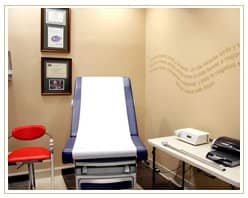Request a video call
Confirm Your Virtual Consultation
Bariatric and Metabolic Surgery Institute Profile Overview
Start in 2003. Formed by a multidisciplinary equipment with have one common objective, to offer a definitive treatment to those patients affected by severe obesity, accompanied by a periodic pursuit that guarantees a loss of healthful weight. At the moment the Metabolic Surgery is added to offer an alternative for the treatment of the diabetes type 2.
The Institute for Metabolic and Bariatric Surgery Center operate in Diagnosis, Advanced Medicine, Medical Conferences and Telemedicine (CEDIMAT) in Santo Domingo, La Union Medical Hospital in North and Metro de Santiago (HOMS), located in Santiago de los Caballeros.
Treatments:
- Gastric Band
- Sleeve Gastrectomy
- Gastric Bypass
- Metabolic Surgery
- Intragastric Balloon
- And Alot more...
Total Patient Care
We are the only Institution in Centroamérica and the Caribbean who has received the Total Patient Care Mention and actually to a passage of being catalogued Center of Excellence.
International patients
Patients who lives outside the country can contact to us through this page or by our telephones numbers to coordinate all the surgery preparation process, being able to realize all the exams in their country or in Santo Domingo.
Please Click Here to request more information from Bariatric and Metabolic Surgery Institute.
Bariatric and Metabolic Surgery Institute, Santo Domingo, Spain Profile Details
Life After Surgery
Dieting
Life After SurgeryThe changes made to your gastro-intestinal tract require permanent changes in your feeding habits, which needs to be watched very closely in order to lose weight successfully. Post-surgery dieting instructions vary from doctor to doctor. It's possible that you know of other patients that have received different instructions after receiving obesity control surgery. Always remember that not all surgeons perform the same surgical procedure for weight loss, and that dieting instructions differ depending on the surgeon and on the type of procedure. It's very important for you to strictly follow your doctor's recommendations. The following are generally accepted instructions for bariatric surgery patients:
- Life After SurgeryWhen you start having solid foods, it is important to chew very well. You will not be able to eat beef, or any other piece of meat unless it is completely chewed.
- Don't drink liquids with your food. These will make you feel full before having enough food.
- Avoid desserts and other sweet foods (when you find sugar as one of the first three ingredients).
- Avoid sodas, nutritional supplements of high caloric content, milk shakes, greasy foods, and high fiber foods.
- Avoid alcoholic beverages.
- Avoid snacking.
Going back to work
Your capacity to regain your activity levels prior to surgery will depend on your physical condition, the nature of the activity, and the type of surgery you went through. Many patients go back to their full activity level six weeks after surgery. Patients who have had minimally invasive laparoscopic procedures can go back to their regular activity in a matter of weeks.
Birth Control and Pregnancy
It is strongly suggested for fertile women to use the most effective birth control methods during the first 16-24 months after weight reduction surgery. The additional effort that pregnancy implies and the potential possibility of fetal leisure make this a highly important requirement.
Life After SurgeryLong Term FolloW-Up
Even though the short term effects of surgical obesity treatment are well understood, there are still matters referring to long term effects in the nutritive and corporal systems that need answers.
The nutritive deficiencies that occur during many years will have to be studied. With time, you'll need periodical check-ups for anemia (low blood hemoglobin), and B12 vitamin, as well as folate levels, and iron. For starters, tests will be practiced
every 3-6 months, or more frequent if required. Then they will be practiced annually or bi-annually.
Support Group
The extended use of support groups has provided patients that have received surgical obesity treatment with an excellent opportunity to share with other people their different personal and professional problems. For example, most of them learn that this surgery does not immediately solve already existing emotional problems, and does not heal the damage that years of morbid obesity have caused to their emotional well-being. Most surgeons form support groups to help you in your short as well as long term problems and needs. Most bariatric surgeons who frequently perform weight reduction surgeries confirm that continuous post-surgical support helps their patients reach higher levels of success.
Please Click Here to request more information from Bariatric and Metabolic Surgery Institute.
Bariatric and Metabolic Surgery Institute Treatments Offered
Surgical Program
Is it For Me ?
In most cases, the minimum requirement to be considered a candidate for bariatric surgery is to be 100 lbs. above ideal body weight or having a Body Mass Index (BMI) of 40 or higher. Occasionally this procedure is seen as someone with a BMI of 35 onwards, if the doctor determines that the health conditions related to obesity have indicated the need to reduce health and weight, as the doctor, the surgery seems to be the only way forward.
The usual indications for any bariatric surgery are:
- Between 16 and 60 years of age
- Percentage of overweight of 40% or over
- BMI of 40kg/m2 or over; or of over 34 if health problems directly related to obesity appear
- Suffering obesity for over 5 years
- Having tried unsuccessfully other non-surgical weight control methods
- Low surgical risk
- No drug addictions or alcoholism
- Psychological Stability (Not showing any psychiatric disease)
- Full awareness of every aspect of the treatment
- Full disposition to follow doctor’s instructions
- Positive insight towards treatment
I Want to Start!
The most important step you must take choosing a weight reduction surgery is to get all the information you need about every different alternative surgery. After all, Luis Betances, M.D., and the medical team of Bariatric Surgery, make the best source of information about the procedure they will recommend. When you have a question, make sure you fully understand the answer. Don't hesitate asking for a more explicit, clearer explanation. The decision of undergoing through a weight reduction surgical procedure is a serious decision, and requires you to be fully updated. The team at Bariatric Surgery can offer you names of other patients who have undergone similar procedures, and that are willing to share with you their experience, good or bad.
Perhaps you would like to investigate on your own about the surgical treatment for obesity in the Internet. As with any search of medical information, make sure that your sources are well known, responsible experts in the field you are investigating.
Although the results of surgical treatment for obesity can be radical, this procedure presents risks, as well as potential complications. Before making your decision, you need to be well informed in this matter. These steps are necessary if you are going to give what is known as an "informed consent" for the procedure to be practiced. The "informed consent" is a legal term which means that the patient agrees having received and understood the information referring to the benefits as well as the risks of the procedure, and that information was enough to allow the patient to make the right decision. Before performing the procedure, your physician will demand that you sign a consent form. Before signing, you have to fully understand what is about to happen. You must know what you need to live well after the operation. Also, you need to be fully aware of the signs or symptoms of the complications that could appear after surgery.
Benefits of the surgery
- The effectiveness of the Bariatric Surgery has demonstrated a 40 to 75% exceed of loose weight.
- According to multiple studies it is the unique real solution to obtain a loss of weight in the long term.
- Due to this it has been cures or improvement in a 90% of the Co-morbidities that accompany to it like Arterial Hypertension, Diabetes, Sleep Apnea, Osteoarthritis, diminish the risks of cardiovascular diseases, cancer and a remarkable improvement of the quality of life.
Surgery Risks
Like any other common surgery the Bariatric Surgery could present some serious risks, others just annoying, but simply in any case the most important are the early detection and treatment. Complications that could appear:
Surgical: Stomach/intestine perforation, internal bleeding, wound infection, injury of some organ or gastric, intestinal obstruction.
Pulmonary: embolias, pneumonia, atelectasis (woven pulmonary collapse), and respiratory insufficiency.
Cardiovascular: Heart Attack, cardiac insufficiency and vascular brain accident.
Fault of some organ, like liver or kidney.
Psycho-social: nervous anorexia, bulimia, depression.
Death. Mortality at international level is approximately 1%.
Others: sliding of the band, infection of the port, infection in urinary ways, allergic reaction to some medicine, esofagitis, gastric flow, stomach ulcers, biliary calculations, constipation, diarrhea, anemia, intolerance to sugars.
Procedures:
Adjustable Gastric Band
The laparoscopic adjustable gastric band (Lap-Band ®) Gastroplasty is purely restrictive, which means that no changes are made in food adsorption or food digestion. Only the food entrance to the stomach is restricted.
This procedure places a silicone adjustable gastric band (Lap-Band ®) in the upper part of the stomach, leaving a small sized stomach pouch of approximately 15 ml. to 20 ml. In a LAP-BAND procedure, there is no stapling in the abdomen and no division of the intestinal tract. This minimally invasive approach involves laparoscopic entrance into the abdomen, after which the area behind the stomach in dissected for placement of the band.
Adjustable Gastric BandThe band is placed about one centimeter below the gastro esophageal junction and closed underneath a balloon, which creates a smaller stomach pouch. A port is placed under the skin to connect to the inside of the band and allow for the opening to be tightened.
This is the latest, most advanced procedure yet, since it is the only surgery that can be adjusted afterwards with a simple skin puncture, and it is 100% reversible.
Advantages
- The procedure is made by laparoscopy (less pain, minimal scarring).
- Band's diameter can be adjuster after surgery.
- Doesn't alter the stomach.
- Band can be removed by laparoscopy.
- If it fails, secondary interventions can be performed with ease.
- The operated stomach can be studied by radiology or endoscopy.
This is the procedure of choice in Europe and Australia, and has been approved in the United States since the 1990's.
Disadvantages
- Not the indicated procedure for overeaters and super-obese patients.
- Easily sabotaged with sweets.
- Requires adjustment of the band unit an acceptable rhythm of weight loss is reached.
- Loss of overweight averages 50-60%.
- Quality of life decrease due to difficulty to ingest foods.
Possible Complications
Intolerance and/or relocation of the band: There is a risk of intolerance, or of it causing adverse reactions of the digestive system, therefore having to be removed and relocated in less than 1% of cases.
Access port infections and migration: There is a chance an infection will appear either in the access port zone, or in the abdomen, and in some cases this may cause the migration of the band to the stomach stomach tissue). In these circumstances re-operating might be necessary.
Migration related complications are caused by excess of saline liquid injected to the band, since it applies too much pressure on the stomach walls. Therefore, the balloon must be filled with a maximum of 9 ml. of liquid, as recommended by the manufacturer. In almost every migration case observed, the liquid content of the balloon is over 11 ml. which represents at
least 2 ml. more than manufacturer recommends. This problem has been virtually eliminated. The occurrence of migration will remain minimal if the system is filled correctly.
Migration can also occur due to a sub-clinical infection. It is important no not allow anyone to inject liquid into the access port, with the wise exception of your surgeon, or a doctor recommended by your surgeon, trained accordingly for this procedure.
Leakage: If leakage occurs in the closed system of the band, in the tube that connects the balloon to the access port, re-operating might be needed. The balloon is made of a very delicate material, and failure may occur shortly after surgery, or years afterwards. In case of failure, the band may be exchanged, or the tube leakage can be fixed with a small operation.
This is actually a very rare occurrence, but the band has been used since 1985, therefore there is a chance that in the long run the band may have to be exchanged for a new one.
Prolapse of the Stomach: Prolapse or slippage of the stomach underneath the band may occur, making the new stomach pouch bigger. In this case, re-operation is needed. Actually this complication is very rare, since a new surgical technique has been developed. To avoid this, the patient must eat only until fullness sensation, and not force the intake of solid foods with liquids, avoid carbonated foods, and excessive amounts of food. Check band adjustment regularly to avoid blockage of the entrance to the stomach.
Reservoir/Tubing problems: The access port could be dislocated; this is very rare, but if it occurs it has to be relocated. While injecting liquid into the access port, there is a chance of perforating the silicone tube.
A metal protector is placed next to the port to avoid tube perforation in this point, and x-ray controls are used in every puncture, therefore, this problem has been practically eliminated.
OTHER COMPLICATIONS: There is a chance of non-specific or non-frequent complications to occur. Please ask your doctor for more detailed information.
Perfect functioning of the band cannot be guaranteed for the rest of your life, but the generalized use of the band since 1985 has led to the perfection of a nearly fail-proof method.
The band will work properly in the majority of the patients, and will allow sustained weight loss in the long run, basically without complications.
The risk of failure of an operation will always exist, even if none of the complications described appear. It should be understood that the possibility of re-operating is an integral part of morbid obesity treatment. Re-operation should be considered a technical measure that is sometimes necessary.
The percentage of re-operations after the placement of the band is minimal, and the possible need of re-operation should not be considered a method failure. Normally, all complications are fixable, and patients return to their regular life after this treatment.
Sleeve Gastrectomy
The Sleeve Gastrectomy (SG) it is a procedure in which one practices is a resection of 60-80% of the stomach approximately in its distensible part, leaving a thin gastric tube. In addition when removing the stomach, significantly diminishes a stimulating hormone of appetite called Ghrelina, reducing the desire to eat that it characterizes the obese patients. This procedure induces a loss of approximate 70% of the excess weight.
Advantages:
- Laparoscopic Procedure.
- No strange bodies or special additives in the interior.
- The anatomy of the intestine is not altered, reason why secondary complications to nutritional deficiencies do not take place.
- This procedure can be made in patients with elevated BMI, older than 60, patients with BMI between 35-45 and patients that don't want to have malabsortive procedure.
Disadvantages:
- Is an irreversible surgery, there is extraction of a portion of the stomach.
- Have the same risks for leak and bleeding than the Gastric Bypass
Laparoscopic Gastric Bypass
Also known as "Roux-en-Y", it's the oldest procedure. It has been practiced since 1966, and has stood the test of time, since it is the only surgery that has been practiced for over 34 years. It is considered the standard with which every other one must be compared to. It has been improved in many details over the years, making it safer and more effective.
In this intervention, an important malabsorptive component is added to the restriction in food intake, in order to obtain better results in the weight loss process.
Advantages
- Good for overeaters and super-obese patients.
- Sabotage possibilities are low.
- Low percentage of re-operations due to failure in long run.
- Loss of 65-75% of overweight, helping over 75% of patients.
- Acceptable quality of life levels, being able to have more variety of foods.
- Minimum amount of secondary effects, and anemia-related problems (Iron, B12 Vitamin).
It is the most common operation being performed in the United States.
Possible Complications
Stenosis: Scarring of the gastro-intestinal connection (anastomosis) reduces the pathway (blockage), inducing vomit. This generally occurs 3-6 weeks after surgery, as well as 6 to 12 months after surgery. These are generally treated with ambulatory dilations by the gastroenterology service.
Gastrointestinal complications: Adherences are always a possibility after a general surgery. These can cause intestinal blockage and its consequences. Though they are very seldom in laparoscopic procedures (<1%), it may need re-operating.
Leakage: Intestinal liquid leakage can occur in the abdominal cavity. This can only happen immediately after surgery, and re-operating proceeds to fix the defect. Diffuse infection can appear, causing septic shock and death. (<1%).
Vitamin Insufficiency: Deficiencies of Iron, B12 vitamin, and folate are frequent in a sub-clinical level. Oral treatment is enough to compensate.
Metabolic Surgery
Diabetes Type II
The Metabolic surgery is a surgical treatment of the Diabetes Mellitus type 2, representing a new option for the treatment in this disease considered until today a medical treatment only.
Metabolic Surgery derives from Bariatric Surgery or Morbid obesity Surgery. Two types of interventions are realized: the Gastric Bypass (see description) and the Duodenum-yeyunal Bypass, which consists of excluding the duodenum and the proximal segment from jejunum (thin intestine first potions) of the transit of foods, producing changes in hormones and receivers located in this area, who have to do with the control of glucose. This procedure can also be realized in combination with the Sleeve Gastrectomy. The Bariatric Surgery difference to the Metabolic Surgery is that can be realized in patients with BMI minor of 35 kg/m2, the primary objective of the diabetes treatment and not of the obesity. This type of surgery has reported the remission of the diabetes in 85% of cases and improvement of a 15%. Is Ideal for patients who by some reason cannot take the correct way their treatment.
Criteria for patient's selection in this type of Surgery:
- 25-60 years old.
- Body Mass Index (BMI) 26 - 35 kg/m2.
- Diabetes Mellitus type 2, less than 10 years of evolution.
- Hypoglycemia oral treatment (tablets) or if the patient is being treated with insulin. Maximum 7 years using it.
Non-Surgical Procedures
Intragastric Balloon
For the patients who have less than 40% of overweight and which they are poor candidates to surgery there are the alternative of the intra-gastric balloon. This spherical ball is made with a soft silicone material and is totally innocuous, when is introduced in the stomach via digestive endoscopy, is fills up with physiological serum and it leaves itself freely floating in the stomach, working like a space device that produces satiety sensation. It’s represents an innovator proposal who serves for the handling obesity to medium term. The Balloon also can be placed in patients with severe obesity that needs to lose weight before the Bariatric surgery
Advantages:
- Do not require Surgery.
- It is placed in ambulatory form via digestive endoscopy, with minimum risks.
Disadvantages:
- It only can remain by 6 months.
- After Balloon is retired some patients return to gain weight.
Post-Surgical Pursuit
After the surgery the patient will be followed periodically by multidisciplinary equipment that includes General Surgeons, Endocrinologists-Dieticians, Psychiatrist and General Doctors. Continuity is part of our specialists of health in different areas is one of the factors that unquestionably contribute to the success of our patients.
The postoperative consultations are realized weekly during the first month, biweekly in the second month, monthly until 6th month, every 6 months until the 2 years and annually.
Please Click Here to request more information from Bariatric and Metabolic Surgery Institute.
Location

About Medical Center
- Speciality: Obesity/Bariatric Surgery
- Location: Calle Pepillo Salcedo Esq. Alturo Logroño Ensanche la Fe, Santo Domingo, Spain
- Overview: Formed by a multidisciplinary equipment with have one common objective, to offer a definitive treatment to those patients affected by severe obesity, accompanied by a periodic pursuit that guarantees a loss of healthful weight.


















.png)








Share this listing